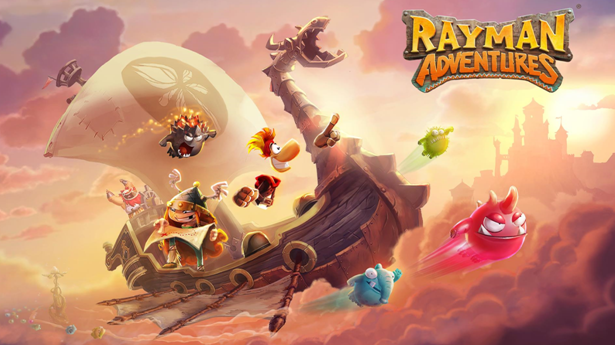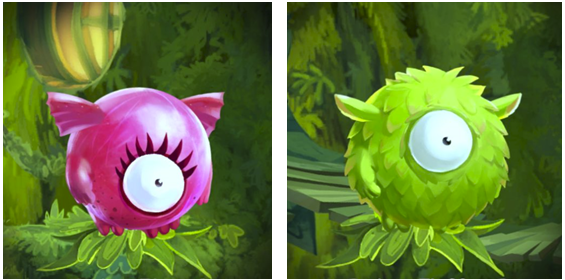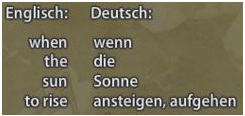The company All Correct Games told App2Top.ru about his experience in localization of children’s games and applications. Including about the experience of working on such titles as Smurfs Epic Run and Rayman Adventures.
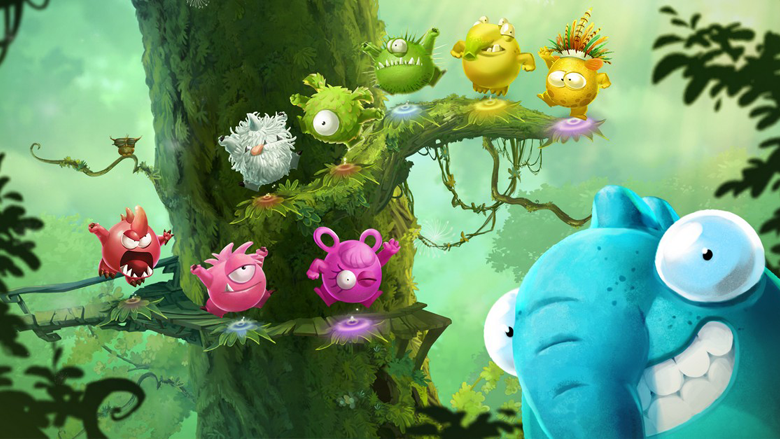
Over the six years of the gaming division’s existence, we have translated several dozen children’s products. And not only games, but also cartoons, books, fairy tales, board games. We would like to share this experience with the example of some of our projects: what should be avoided when localizing children’s applications, and which principles, on the contrary, should be adhered to.
When we were first ordered such a translation — and it was a cartoon for kids from 2-3 years old — we decided to contact a child psychologist to learn more about the peculiarities of children’s perception. In the course of working on other projects, the list of principles has been expanded.
In applications for preschool children should not be:
- compound and compound sentences, adverbial and participial phrases (they are too complicated for kids to understand);
- phraseological units and phrases with a figurative meaning (children often take them literally. That is, instead of “trapped”, it is better to say “got caught”, instead of “bored” — “sad”);
- references to alcohol and sex (probably, comments are not needed here);
- borrowed vocabulary (for example, the Russian word “monster” is in no way inferior to the word “monster” that came from the English language and is certainly more understandable);
- slang (we have chosen a synonym for “cool” and “cool”);
- words with negative connotation (in one of the projects we found it necessary to replace “sacrifice” with “offering”, since the context allowed);
- complex vocabulary (for example, instead of the phrase “I have diarrhea”, we used the construction “my tummy hurts”).
What should be used instead of the above:
- simple sentences;
- simple vocabulary;
- informal appeal;
- words with diminutive suffixes.
I think you have already understood the general principle of translating children’s products: everything should be extremely logical and understandable and not cause ambiguous understanding.
Usually localization of applications for kids does not cause any special difficulties, because there is not too much text in them, and the skills that the child learns during the game are quite simple. Such was, for example, the work on the translation of the Chili Fish application. This is an educational game in which a child can create and color a variety of fish of various shapes.
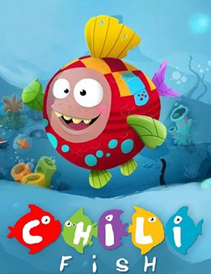
We translated marketing descriptions for her. Basically, the text consisted of simple sentences with imperative verbs in the present tense. We used the appeal to “you” (“paint”, “mix”), the simplest possible constructions (“feed the fish”, “paint it”) and words with diminutive suffixes (“eggs”, “fish”).
But when localizing the game Smurfs Epic Run, one of our largest customers, Ubisoft, there were some difficulties.
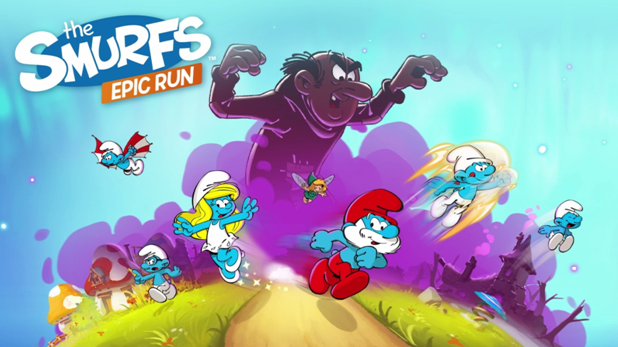
“Smurfs: Legendary Race” is an arcade game for mobile devices based on the world—famous animated series about blue-skinned creatures. The game is designed not only for children, but also for adults, especially for Smurfs fans. But when translating, we still focused on preschoolers, because the rating of the application is 4+.
Before starting work, Ubisoft provided us with reference materials describing the game, and we watched several episodes of the animated series and feature films.
The game had its own peculiarities, although this is not uncommon and is often found in other projects.
- Strict restrictions on the length of the string. It was necessary to fit the translation into a certain number of characters.
Most often, the length of the translation line should not exceed the length of the original line. For example, for the Leaderboard header, the line limit was 12 characters. It would be possible to translate the usual “Leaderboard” (14 characters), but we used the “Leaders” option (6 characters).
Unfortunately, Russian is not as concise as English, and in many cases we had to shorten words. These phrases were often difficult to understand, especially for children. After we voiced our concerns to the customers, they listened to our opinion and increased the allowed string length.
We are especially glad that in the end there are no phrases like “Product.: discount #% (alm. or mon.)” — an abbreviated translation of the phrase Companion sprices: #% off (gems or coins). Otherwise, not every child would be able to immediately understand that “Goods.” are actually “comrades”, “alm.” — diamonds, “mon.” — coins.
- Translation of names. It all depends on whether these characters are new. If yes, then we either use transliteration or transcription, or literary translation — if they are speakers. If these characters have already met somewhere (in cartoons, in our case), we study the information on the Internet and look for existing translation options in order to maintain uniformity.
When translating names, we used encyclopedias compiled around the world of Smurfs by their fans. But sometimes we came across names whose translation was not provided in publicly available sources at the time of working on the project. In such cases, we followed the general rules for translating the names of Smurfs: the word smurf is discarded, the name remains, in the name of which the main characteristic of the character is present. In some cases, when it was appropriate, we used diminutive suffixes.
King Smurf — The King
Snappy Smurf — Quibbler
Chilly Smurf — Merzlyak
Thief Smurf — A Thief
- Informal appeal. It is best to address the child with “you”, but in some cases, or rather when translating constructions in the past tense in games in which the gender of the character is not specified, some difficulties may arise with this. They are typical for localizers, and this is what we teach our translators in the first place.
Let ‘s look at the example of translating a sentence:
You have received 5 gems — “You have received (received) 5 gems”.
The options in parentheses are unacceptable to us, so we need to apply one of the following translation solutions:
– depersonalize the design: “I managed to get 5 gems”;
– use the present tense instead of the past: “You get 5 gems”;
– use the passive voice: “5 gems received”.
On this project, we mainly turned to the latest solution:
You have collected 80 Stars! — 80 stars collected!
You have jumped 15,000 Times! — 15,000 jumps have been made!
However, in some constructions it was not very appropriate, and we used the present tense instead of the past, for example: You failed! — “You’re losing!” instead of “Lost!”.
- Simplified vocabulary. When translating children’s apps, we try to use as simple words as possible.
We mainly work with applications for children of primary and secondary school age, which means that you can not strictly adhere to the rules mentioned above. Even younger schoolchildren can already perceive more complex sentences, understand the play of words and the meaning of phraseological units.
When working on another Ubisoft project, Rayman Adventures, we actively used it.
This game is a continuation of the saga of the fearless adventurer Rayman and his brave companion Barbara. In this part, the heroes go in search of the missing eggs of the Improbables to breathe new life into the withering Sacred Tree.
Improbables is a translation of the English Incrediballs, combining the words balls and incredible. At first we were going to use the “Shakes” option, but it seemed too similar to the name of the famous Russian animated series.
In general, when working on this project, we had to use ingenuity, imagination and erudition to the fullest, study dictionaries of synonyms, various reference books and information about previous versions of the game.
Perhaps the most interesting moment of localization was the translation of the names of the families of the Improbables and their names. Ubisoft, as always, provided us with a lot of reference materials: images of family members and their descriptions, and even shared some ideas about translation. It was necessary to take into account that each family has a unique shape (a certain group of Improbables resembles a certain fruit, vegetable or substance) and a general idea (some families are strong and pugnacious, others are sweet, others are connected with computers, etc.). The names of creatures of the same family had to be interconnected and reflect one from the general signs. The customer gave us complete freedom, it was only necessary to avoid obscene words and references to alcohol.
Here are some examples.
The name of The Gleaks family is based on a play on the words leek — “leek” and geek – “crank” or “nerd”. It was translated as “Nerds”, so we reflected both the plant origin and the eccentricity of these Improbables.
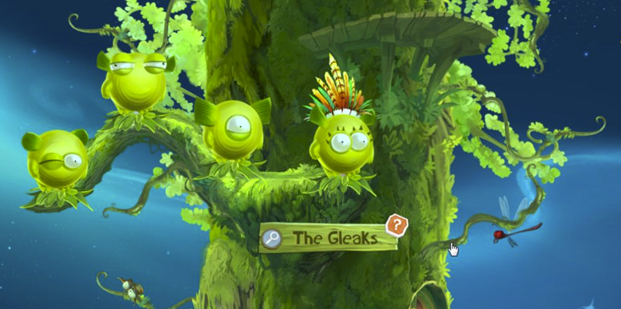
When translating names, verbatim was not always appropriate, since the original uses a wordplay applicable only to the English language.
Original names: Paige 404, Buff’ring, Mbits, Dawn Load.
Our options are: Klava, Percent, Monique, Cooler.
For example, Paige 404 is a mix of the 404 Not Found error code and the English name Paige. When trying to translate into Russian, taking into account the wordplay, the general idea that was supposed to unite all creatures from the same family could be lost. Therefore, we decided to beat the fact that these Improbables are described as lovers of sitting at the computer, and named them using the slang names of computer components widely known to the Russian user. Here we could not avoid using slang, because it was necessary to adhere to a certain topic.
As recommended by the psychologist, we tried to use diminutive suffixes. This is evident from the names of the families.
The Snifflers (to sniffle) — Sniffles
The Petrolers (petrol — gasoline) — Oil
The Blingblings (blings — “trinkets“) — Trinkets
We also made sure that each character’s name was appropriate. To do this, we requested information about the name of one or another depicted Improbable. We learned that girls differ from boys by having black cilia. Take a look, for example, at a Vine from the Hailstones family and a Green Onion.
By the way, the most difficult thing was to come up with names for a large family of Hailstones (The Wy-Ners), because they were supposed to remind of grapes, but not of wine. In the original, the names of grape varieties were used as names: Chard-O-Nay, Merl-O, Caber-nay, Rose-A, Pin-O, So-Vin-Yawn. However, for a Russian user, a literal translation is likely to cause a persistent association with alcohol. And, as you remember, we were asked to avoid any associations with this kind of drinks. We called one of these Improbables a Tendril: a reference to the tendrils of the vine and a playful abbreviation of the surname of our full-time translator. The rest: Raisin, Lozochka, Grozdinka, Isabella, Kishmish. The last two got their name in honor of famous Russian grape varieties.
And when translating the description of this family, we had to resort to adaptation.
The Wy-Ners are a tight-knit family that stays in groups for safety. They may whine a little when stepped on…
In the original, as you can see, the homophones wine — “wine” and whine — “complain” are used. In the Russian translation, we beat this with the help of the single-root word “hail” (from “grape”) and a stable combination of “hail of reproaches”.
The Gradinki are a very friendly family. Its members always try to stay in groups, because it’s safer that way. If you step on them, they will bring down a hail of reproaches on you.
Developers regularly update the game and introduce new creatures into it. One day there was a funny situation when the next update came out and we urgently had to come up with a name for The Roses family — “roses” (later it was renamed The Best Buds). It would seem that they are just “Roses”, but everything is not so simple. After all, one of the first families was The Pinkies (pink — “pink”) — “Pinkies”, and the same-root names, in our opinion, can confuse a young player. We knew that they looked like rosebuds, were very attractive and were representatives of famous couples. In the original, they were called as follows: Juliet (from “Romeo and Juliet”), Louise (from “Thelma and Louise”), Sally (from “When Harry met Sally”), Fiona (from “Shrek”), Bella (from “Twilight”) and Anastasia (from the cartoon about the Russian Princess). Unfortunately, some of these names are not so widely known in Russia, so we decided to adapt them: slightly alter the names of beautiful girls from Disney cartoons. So there was a family of “Charmers”, consisting of princesses: Rosahontas, Aurora, Snow White, Rosabelle, Rosemin, Rosushka.
As mentioned above, we translate not only applications, but also fairy tales. Another project for children of primary and secondary school age, in which we took part, is the translation and voiceover of books written by Anna Solnechnaya: “Fuzzies. Multicolored rains” and “Tower in the Moon Forest”.
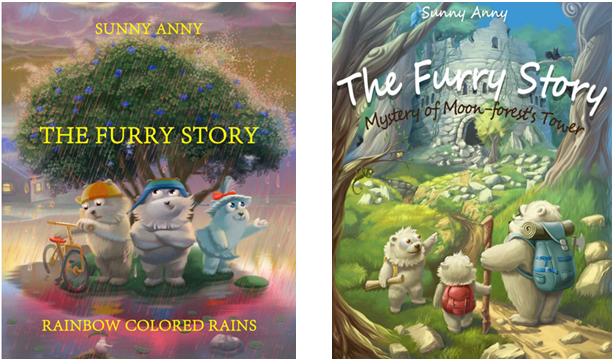
The language of a fairy tale should not be unnecessarily literary and difficult to understand. We tried to make the text so that it would not be difficult for a child to understand, so that it would be euphonious. After all, this is especially important for the work that parents will read to the baby before going to bed.
When translating, we used Participle I and II to a minimum and tried not to overload the text excessively with the coordination of tenses. We also tried to choose a generally accepted, simple vocabulary. For example, when translating the word “hibernation”, not the popular hibernation option was chosen, which is more suitable for some documentary or fantasy film, but sleep. Special attention was paid to the transfer of wordplay and phraseological units. This was dictated by the genre of the work and the age of the audience.
When translating the phrases of one of the heroes of the book, Uncle Hive (Uncle Buzz), who looked like a bee, buzzing sounds were added to the character’s speech to enhance the effect of onomatopoeia. This decision was approved by the customer.
Everyone complains that the same sweets are on the menu of our coffee shop.
Everyone keeps complaining that my dezzzzerts are always the same.
It’s all happened before.
I tried zzat already.
By the way, Uncle Uley was sometimes called Uncle U for short. When translated into English, Uncle B sounds like bee — “bee”. We thought it was more than appropriate, because the target audience can already understand the pun.
Of course, we engaged a carrier to work on the project so that the text sounded authentic. Most often we translate texts into the American version, but here, at the request of the customer, the British one was used. For example, the word “student” was passed as pupil, not student.
When translating some words, such as class/classroom and subject/activity, which can be translated with the same word class/classes, we used different options so as not to confuse the child.
One day, the fuzzy twins stayed at home longer than usual and flew into the classroom at the last minute.
One day the Furry twins were so late for class that they burst into the classroom at the very last minute.
And the objects were quite unusual.
And the subjects themselves were very unusual.
For the word “class” in the meaning of classroom, classroom was used, for “classes” — class, for subjects — subjects.
In addition, as already mentioned, we took part in the voiceover. It was produced in two languages — Russian and English. The voice acting was multi-voiced, and we tried to select the voices so that they fit the main characters: pushy-mom, pushy-dad, the fluffy twins.
As you probably know, our company is engaged in translating games not only in the English-Russian pair. One of these projects was Wiki Online, a browser—based online game in German based on a popular cartoon. What we especially liked is that it contains English language training and a geography quiz.
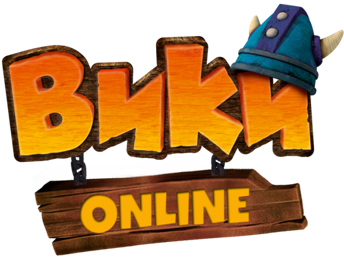
We were provided with wonderful, very detailed reference materials, but we nevertheless searched for additional information and found out that there is a 1974 anime series, a 2009 film and a 2013 3D animated series. Only the film was translated into Russian. We were guided by him when translating names. Some Internet materials indicate that the father of the main character is called Halvar, and the film uses a variant of Halvar, more familiar to Russian ears and corresponding to the established tradition of translating Scandinavian names.
During localization, we managed not to use slang:
Cool, was?!
Great, right?
We also avoided words with negative connotations. For example, the German Opfergabe translates as sacrifice. We had 2 replacement options: “offering” and “gifts”. The second word has a pronounced positive connotation, so we settled on the neutral version of “offering”.
As for phraseological units, we considered it necessary to use them, since the game is educational.
Das erfreut den Göttervater, und da will er sich nun auch nicht lumpen lassen!
This pleased the Father of the Gods, and he also does not want to lose face in the dirt!
The English language teaching block is presented in the form of a quiz, and the features of its construction are reflected in the localization process.
For example, this is how the training page looks like:
There were no problems with the words when, sun, to rise. But both in English and in German there are articles that are not translated directly into Russian. We decided that in such cases it is better not to leave an empty space, but to indicate what kind of article it is (in this case, the is a definite article).
After each training block, the player must pass a quiz to test their knowledge. Below is an example of possible answers to the offer to choose the German equivalent of the verb to run.
- rennen (run)
- rufen (call)
- reden (talk)
- reiten (riding)
As you can see, their choice is based on consonance, and we decided to display the principle of similarity, using words from the same group as answers, namely groups of verbs of movement: run, jump, swim, ride. Previously, we, of course, clarified with the developers, the answers under which number are correct.
The quiz on country studies looks like this: the player studies the text, and then answers questions about it. We did not just translate some of these texts, questions and answers, but culturalized them, since they were primarily aimed at residents of Germany.
A few words about the adaptation of the names of objects for children’s applications. Imagine our feelings when we were faced with the presence of two swords in the game: Prinz Charmings pulsierendes Liebesschwert and Prinz Charmings geöltes Liebesschwert. Literally, they are translated as “The Pulsating sword of Prince Charming’s love” and “Oiled (or “oiled”, which is not better) the sword of Prince Charming’s love.” After a little brainstorming, we came to the conclusion that since there are only two of them, then surely one of them is the main one and the other is the spare one (unless the prince has pumped the “Two Swords” ability). So the not so original, but much safer-sounding “Prince Charming’s Favorite Sword” and “Prince Charming’s Spare Sword” were born.
And finally, a little bit about the Horse Haven project. This is a game in the “farm” genre, the target audience of which are girls of younger and middle age.
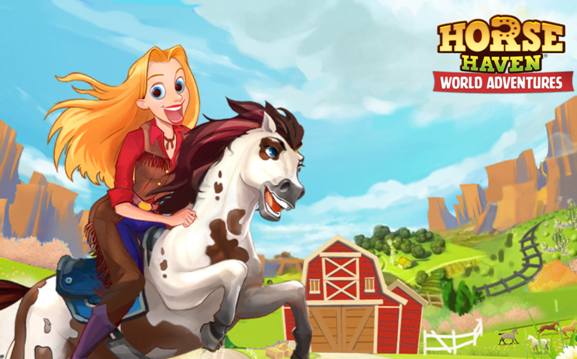
Despite this, we tried to translate as neutrally as possible, because we know that brutal bearded men are not alien to the love of horses: we used impersonal constructions, and for direct appeal to the player (in English — cuz, abbreviation from cousin — cousin, cousin), we chose the word of the general kind “crumbs”.
I see you got the old Storage restored, Cuz.
I see you’ve managed to restore the old warehouse, baby.
The methods of “depersonalization” have already been mentioned above, but other, shorter ones would be inappropriate in this case. After all, you can’t say: “I see you are restoring the warehouse” when the result is shown on the screenshot, or “I see the warehouse has been restored by you” — it sounds quite official.
Sometimes we used complex vocabulary when translating:
This horse is in breeding (to breed — breed, breed).
The horse participates in the process of breeding a new breed.
Here we decided not to focus on reproduction, but, on the contrary, to slightly distance ourselves from direct reference to this intimate process.
The great thing is that this game, like many other modern games for children, is not only entertaining, but also educational, because it also has a quiz. Her questions depend on which country the farm is located in — they can be built in different parts of the earth. I didn’t have to culturalize the questions, but it was very interesting to translate many of them, especially those concerning horses. There are several dozen different breeds in the game, and we used encyclopedias to translate the names, studied photographs — as a result, we learned a lot of new things ourselves.
Here are some interesting moments from the life of the children’s app localizer. Of course, there are actually many more such features, as well as the projects we are working on, but more on that next time.

